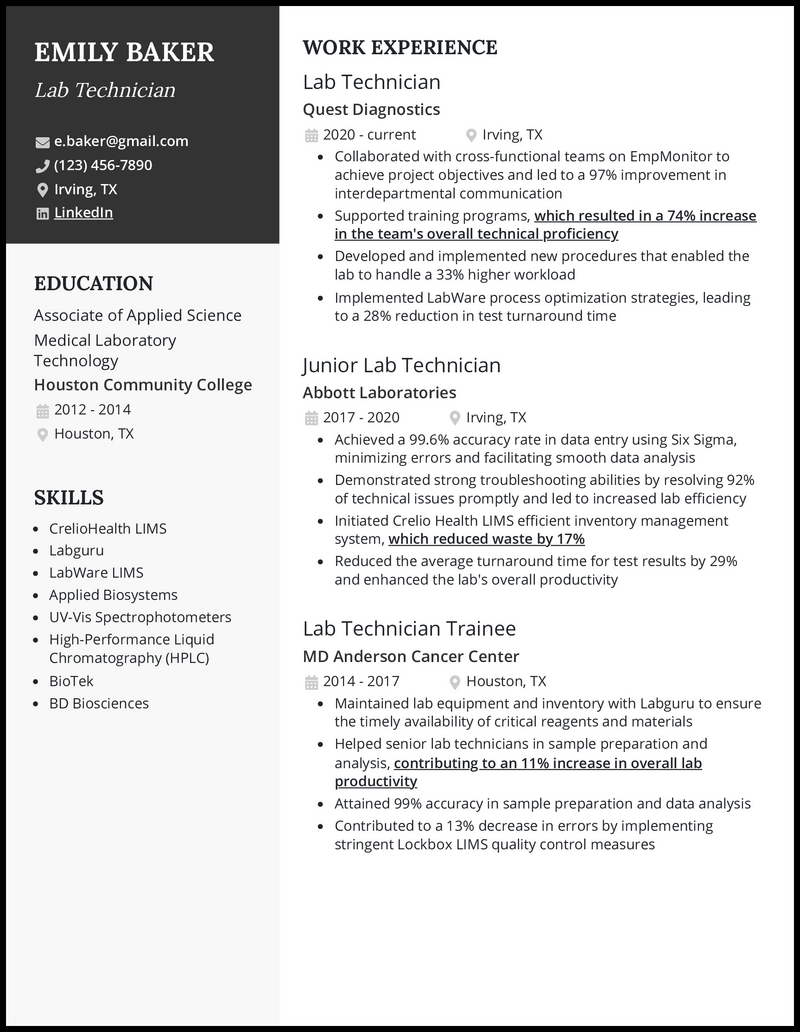Stepping into the competitive world of laboratory work requires more than just excellent scientific skills; it demands a CV that truly stands out. As a lab technician, your precision, attention to detail, and practical expertise are your greatest assets, and your CV is your first opportunity to showcase these crucial qualities to a prospective employer. It’s not just a document; it’s your professional story, meticulously laid out to impress.
Finding the right cv template for a lab technician role can feel like a daunting task, especially when you want to highlight everything from analytical techniques to safety protocols. A well-structured and compelling CV can be the key to unlocking exciting career opportunities in various scientific fields, from healthcare to research and development. Let’s explore how you can build a robust CV that gets you noticed.
Building a Foundation for Your Lab Technician CV
Crafting an impactful CV for a lab technician position means focusing on clarity, relevance, and quantifiable achievements. Employers are looking for individuals who can seamlessly integrate into their lab environment, demonstrating both technical prowess and a strong understanding of laboratory ethics and safety. Your CV needs to clearly articulate your capabilities, showing how you can contribute from day one.
Think of your CV as a precise experiment – every section needs to be accurate, well-organized, and contribute to the overall result: landing an interview. Start with a strong personal statement or summary that immediately highlights your most relevant skills and career aspirations. This section should act as a quick overview, giving recruiters a snapshot of your professional identity and what makes you a suitable candidate for a lab role. Following this, detailing your technical skills is paramount.
Highlighting Your Specialized Technical Skills
In the lab technician field, specific skills are often non-negotiable. Whether it’s PCR, chromatography, cell culture, or microscopy, listing your proficiencies clearly and concisely is crucial. Don’t just list them; consider the level of your expertise. Are you proficient, experienced, or an expert? This nuance can make a difference. Also, think about the equipment you’ve operated and the software you’re familiar with, as these are equally important.

When detailing your technical abilities, be as specific as possible. Employers appreciate knowing the exact methodologies and instrumentation you are comfortable with. Here are some examples of skills often sought after:
- Molecular biology techniques (e.g., DNA/RNA extraction, PCR, Western Blotting)
- Cell culture and aseptic techniques
- Microscopy (light, fluorescence, electron)
- Chromatography (HPLC, GC) and Spectroscopy (UV-Vis, FTIR)
- Flow cytometry and ELISA
- Operating and calibrating laboratory equipment
- Maintaining accurate laboratory records and preparing reports
- Adherence to GLP, GMP, and safety regulations
Your experience section should go beyond just listing job titles and dates. For each role, use strong action verbs to describe your responsibilities and, more importantly, your achievements. Did you improve a process? Reduce error rates? Train new staff? Quantify these achievements whenever possible. For example, instead of “Performed experiments,” try “Performed 100+ molecular biology experiments per week, reducing sample processing time by 15%.” This approach transforms your experience into tangible contributions, showcasing your value to potential employers.
Polishing Your CV for Maximum Impact
Once you have the core content down, the next step is to refine your CV to ensure it truly shines. This involves paying close attention to detail, a trait highly valued in any lab setting. Remember, recruiters often use Applicant Tracking Systems (ATS) to filter applications, so incorporating relevant keywords from the job description is absolutely essential. Read the job posting carefully and weave those specific terms into your skills and experience sections naturally.
Beyond keywords, the overall presentation of your CV matters immensely. A clean, professional, and easy-to-read layout makes a huge difference. Avoid overly elaborate designs or distracting graphics. Simplicity and clarity are key. Ensure consistent formatting throughout, from font sizes to bullet points, demonstrating your meticulous nature. Proofreading is another critical step; even a single typo can undermine your credibility when precision is expected.
Consider including a dedicated section for any certifications, licenses, or professional development courses you’ve completed. This could include certifications in good laboratory practices (GLP), HIPAA compliance, or specific instrument operation. These additions not only enhance your qualifications but also demonstrate your commitment to continuous learning and professional growth within the scientific community. It shows you’re proactive and invested in your career.
Finally, don’t underestimate the power of a tailored CV. While a cv template for a lab technician can provide a great starting point, always customize it for each specific job application. Highlight the skills and experiences most relevant to the role you are applying for, even if it means reordering sections or rephrasing bullet points. This thoughtful approach shows genuine interest and makes your application much more compelling than a generic submission.
Crafting an exceptional CV is an investment in your career, particularly in a specialized field like laboratory technology. By focusing on clear communication, highlighting your unique technical skills and achievements, and meticulously refining every detail, you can create a document that truly represents your professional capabilities and aspirations. Your CV is your professional handshake, setting the stage for future opportunities.
With careful attention to structure, content, and presentation, you’ll be well-equipped to present yourself as the ideal candidate for your dream lab technician role. Take the time to perfect it, and you’ll significantly increase your chances of securing those coveted interviews and advancing your scientific career.
